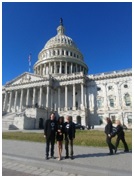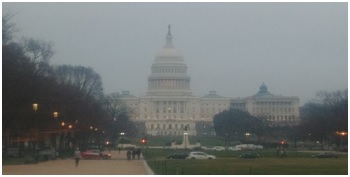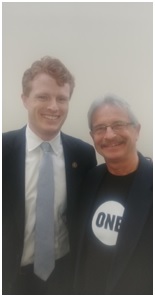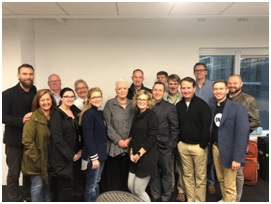Global Justice in Washington, D.C., by Rev. Dr. Stan Adamson PCUSA, retired (ad*********@*sn.com)
And the King will say to them “Inasmuch as you have done it to the least of these my brothers [and sisters], you have done it to me”—Matthew 25:40
To whom much is given, much will be required—Luke 12:48
Following Jesus means caring above all for the poor. Living out our faith means loving neighbors locally and globally. As a working Pastor, this was always one of my highest goals and greatest privileges. I was fortunate to work with congregations who shared this compassionate and global perspective. I continue this work in retirement through service on the Board of the Colorado Council of Churches.
Sunday, February 25, 2018, I made my way to Washington, D.C., after a hiatus of forty-two years. It hearkened back to this earlier visit, when I was Moderator of the Advisory Council on Church and Society for the Synods of Mid-America of the former United Presbyterian Church in the United States of America. It was April during the Bicentennial Year, 1976, during the administration of President Jimmy Carter. I quipped to friends, “I’ll have been in D.C. during the terms of two backlash Presidents,” Carter, following Watergate, and Trump, in a whipsaw retreat from President Obama’s two-term tenure. What a contrast!
In 1976 I was in Washington at a meeting of IMPACT: a coalition of the Washington offices of all the mainline denominations. This time I was there at the behest of ONE, a global, non-partisan, faith-friendly, non-profit, non-governmental organization, begun around 2005 to hasten achievement of the Millennium Development Goals, working to eradicate poverty in sub-Saharan Africa (www.ONE.org) . Their efforts to shape public policy in the developed nations had yielded a reduction in the poverty rate by 50%, a vast reduction in the rate of AIDS/HIV, an increase in the percentage of women and girls receiving an education, a growth in entrepreneurship, and other major advances in this struggling part of the African continent. ONE is somewhat unique in that it doesn’t raise funds: one becomes a member by taking some action to advance these goals: writing a letter, posting a concern, visiting a legislator’s office. Funding is raised from a small number of wealthy donors and foundations, such as Bono, the lead singer for U2 and the Bill and Melinda Gates Foundation.
Back when the organization was young, I recruited a young man in my congregation in Boulder, Colorado, to attend a summit much like the one I attended last month. He was so impressed by ONE that he became a major organizer in Colorado. ONE has more than nine million members worldwide, and more than 35,000 in Colorado.
Following 2015, the Millennium Goals morphed into similar Sustainability Goals. Throughout its existence, ONE has aimed at influencing public policy to get at the root causes of extreme poverty. The annual Power Summit calls on representatives from as many States as possible, students, community organizers and faith leader. We were together to prepare of Lobby Day on Tuesday, February 27; the goal was for the 140+ participants to visit as many legislators as possible on that single day. We all wore ONE t-shirts, so we became a very visible presence on Capitol Hill. Because I had been contacted through the Colorado Council of Churches, I represented the entire faith community in Colorado, and therefore I would make calls on as many Colorado legislators as possible.
Sunday evening participants were invited to attend small dinners at local restaurants, featuring representatives of the ONE Team. I met for the first time some of my counterparts, and we had a conversation with Steve Pearson, the new Development Director of ONE. It was a very nice setting for learning more about the ongoing funding and development of ONE, maintaining support from the small number of donors needed.
Monday was a training day for all the participants. As a retired Pastor, it was so gratifying to train with a roomful of nearly 150 college and university students and community organizers, most in their early twenties. Anyone worried about Millennials should have this experience. The presenters were from various backgrounds in public service and in the art of lobbying, something I’ve never done before (and a term that has a decidedly jaded ring to it!). but there’s lobbying, and then there’s lobbying. To lobby on behalf of the world’s poor is a thrilling, not sinister, effort.
We were schooled not only on the art of lobbying, but on the substance of what we were lobbying about:
- To encourage our legislators not to accept the White House’s recommendation that the State and Foreign Operations portion of the Fiscal Year 2019 Federal Budget be cut by thirty per cent. This portion of the federal budget represents only one per cent of the total, yet it includes the entire State Department, the Peace Corps, PEPFAR (President’s Emergency Plan for AIDS Relief, a project of the George W. Bush administration, continued by President Obama), USAID and other foreign aid programs.
- To ask our legislators to co-sponsor or sign on to the bipartisan BUILD Act, which was to be introduced on the floor of both houses on Tuesday. In a nutshell, the BUILD Act (HR 5105 and S 2463) would replace OPIC (Overseas Private Investment Corporation) and a few provisions of USAID with a new Development Finance Corporation, a 21st century funding organization to encourage the private sector to invest in businesses in Sub-Saharan Africa and other developing parts of the world.
This was a great introduction to how public policy is crafted, and how citizens can participate in shaping U.S. policy vis á vis the global poorest of the poor. The terrific training we received included the reminder that we were not pushing a party line, and that we were to be ourselves, and to tell our own stories of work with the poor through our ministries and life work. I had a chance that afternoon to meet the two CU Boulder students with whom I’d be working on Tuesday, and to develop a strategy for our presentations, especially since we might have only 15-20 minutes in each office.
That night, Jared Noetzel, the Faith Coordinator for ONE, hosted a clergy dinner. We shared which regions we represented, and then heard from Michael Gerson, columnist for The Washington Post and The Atlantic, who had been a chief speechwriter for President George W. Bush. It was a candid presentation about the unprecedented crisis for faith and politics in the current administration, with emphasis on the abdication of moral leadership among Evangelicals. Gerson has since published a similar article in The Atlantic Magazine (https://www.theatlantic.com/magazine/archive/2018/04/the-last-temptation/554066/). It was a soul-searching evening for all of us.
We began lobby day in a gathering place in one of the Senate Office Buildings. After hearing pep talks from Representative Joseph Kennedy III (D) of Massachusetts and Representative Nita Lowey (D) of New York’s 17th District. We heard from the co-sponsors of the BUILD Act, Representative Adam Smith (D) of Washington’s 9th District, and Representative Ted Yoho (R) of Florida’s 3rd. Rep. Yoho was exciting to hear, since he had come to Washington intending to reduce foreign aid. Through the influence of his constituents, and of the ONE Campaign, and his friendship with Rep. Smith, he professed to have turned around, and come to see diplomacy and aid as vital to peace and stability. As a Republican, he championed the BUILD Act because it promotes a private enterprise solution for development and will return more money to the U.S. Treasury than it lends over time, much like its predecessor OPIC. Rep. Yoho reminded us that of the top fifteen trading partners with the U.S., twelve were former recipients of aid! This “aid to trade” theme is popular with Republicans!
Then the teams from each State had a final strategy session and set off to begin their legislative visits. Because I represented the whole State of Colorado, I girded myself to make calls on eight of the nine Colorado legislators offices! At the end of the day I had a blister on my heel from all the running! With my teammates Shrea Ghosh, an international student from Dubai who provided the global perspective, and Ben Sykora, the founder and President of the ONE campus chapter at CU Boulder, we trekked out into a beautiful day–70º and clear blue sky, a marvel for February in D.C. The students each made five calls, but I soloed on three, and it was a breathless pace, but exhilarating, back and forth from the House to the Senate office buildings. We were gratified to hear from most of the legislators’ staffs that the reduction in the State and Foreign Operations budget was, in their words, “dead on arrival.” We heard this equally from Republicans and Democrats, though not unanimously.
Mostly we met with staffers, except for Representatives Ken Buck (R, 4th District) and Jared Polis (D, 2nd). Because of the t-shirts emblazoned with “ONE,” Rep. Buck stopped on his way out of his office and asked, “What’s ONE?” This gave us a chance to give our quick “elevator speech” and snap a photo before we met with his staff. Each office received with interest our “leave behind” packet with detailed info about the Budget and the BUILD Act. There were nice surprises along the way, like learning that one of Rep. Doug Lamborn’s staffers was born in Uganda, and so had an immediate appreciation for the goals of ONE.
At the end of this exhausting but exciting day, there was a Volunteer Appreciation Banquet at Gallaudet University where most of the Summit activities had taken place. It was great to meet others from all over the country. Providentially, I ended up sitting next to Nico Gist, student founder of the ONE chapter at UCLA, my alma mater. It was great to get to know what he was doing their to live his faith through this advocacy for the poor.
Wednesday morning, after most of the other participants went home, a dozen pastors gathered at the ONE USA Headquarters on F Street, just a few blocks from the White House. We spoke about strategies to grow ONE among pastors and other faith leaders in our respective States. We met with Gayle Smith, Executive Director of ONE (she’s in the center of the photo). And we met with other staff, particularly with Jared Noetzel, Director of Faith Relations & Strategy.
This was a life-changing experience. I would like to find ways to empower others to get involved with ONE, since it makes a difference for the poor in Africa and beyond.





